EDN519: Impact of ICT on International Education for the 21st Century
VerifiedAdded on 2023/05/28
|12
|2949
|453
Report
AI Summary
This report, addressing the impact of ICT on international education in the 21st century, examines the effects of globalization and e-learning on the educational landscape. It investigates the positive impacts of ICT, such as expanded access to education through distance learning and enhanced student engagement via digital resources. The report also acknowledges the negative impacts, including potential challenges related to teacher training, costs, and digital resource access. It delves into issues like educational innovation, curriculum adaptation, software copyrights, and cyberbullying, while also exploring ways to develop and integrate ICT effectively in education systems. The analysis further considers cultural differences and the role of independent learning within the context of ICT, concluding with a call for strategic implementation and ongoing support to maximize ICT's benefits in international education.
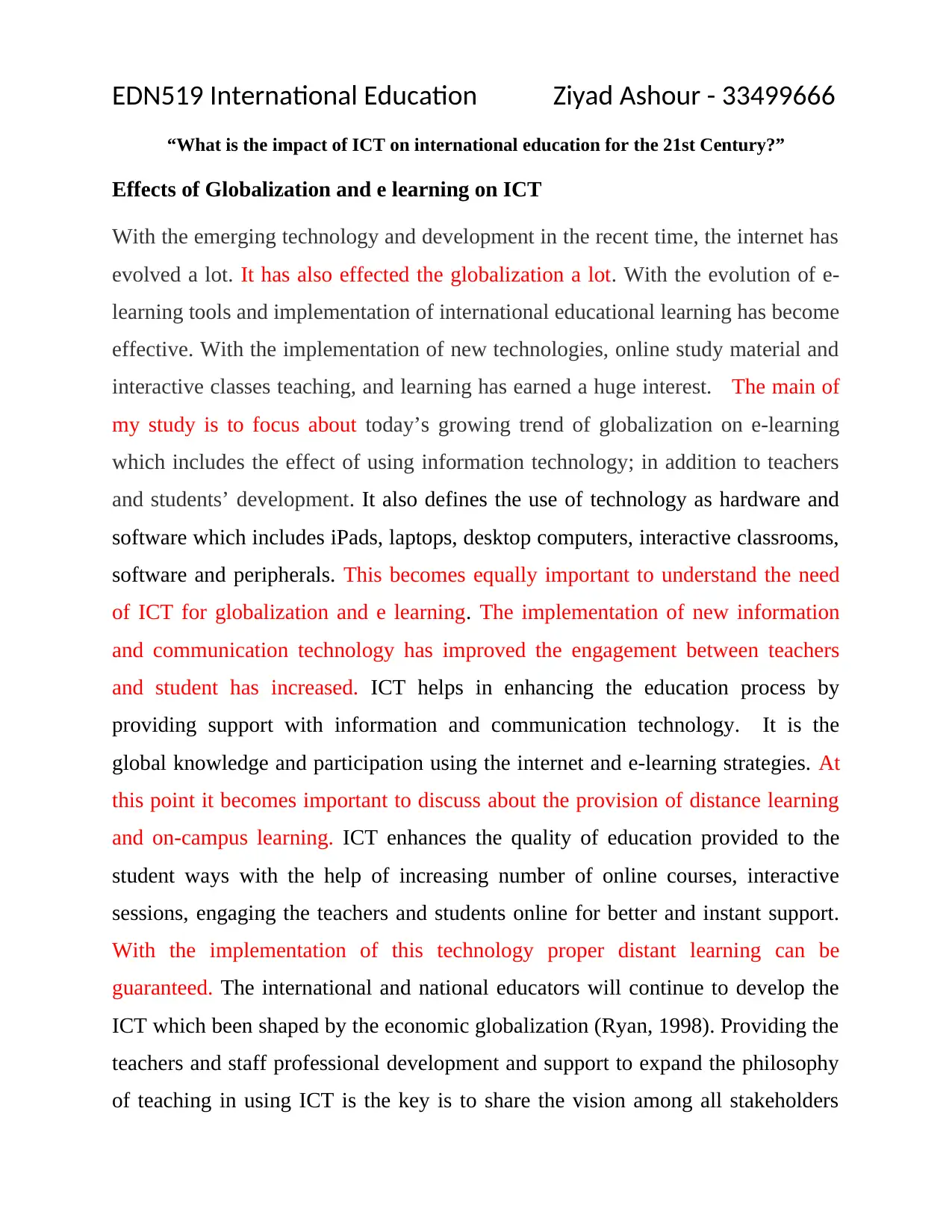
EDN519 International Education Ziyad Ashour - 33499666
“What is the impact of ICT on international education for the 21st Century?”
Effects of Globalization and e learning on ICT
With the emerging technology and development in the recent time, the internet has
evolved a lot. It has also effected the globalization a lot. With the evolution of e-
learning tools and implementation of international educational learning has become
effective. With the implementation of new technologies, online study material and
interactive classes teaching, and learning has earned a huge interest. The main of
my study is to focus about today’s growing trend of globalization on e-learning
which includes the effect of using information technology; in addition to teachers
and students’ development. It also defines the use of technology as hardware and
software which includes iPads, laptops, desktop computers, interactive classrooms,
software and peripherals. This becomes equally important to understand the need
of ICT for globalization and e learning. The implementation of new information
and communication technology has improved the engagement between teachers
and student has increased. ICT helps in enhancing the education process by
providing support with information and communication technology. It is the
global knowledge and participation using the internet and e-learning strategies. At
this point it becomes important to discuss about the provision of distance learning
and on-campus learning. ICT enhances the quality of education provided to the
student ways with the help of increasing number of online courses, interactive
sessions, engaging the teachers and students online for better and instant support.
With the implementation of this technology proper distant learning can be
guaranteed. The international and national educators will continue to develop the
ICT which been shaped by the economic globalization (Ryan, 1998). Providing the
teachers and staff professional development and support to expand the philosophy
of teaching in using ICT is the key is to share the vision among all stakeholders
“What is the impact of ICT on international education for the 21st Century?”
Effects of Globalization and e learning on ICT
With the emerging technology and development in the recent time, the internet has
evolved a lot. It has also effected the globalization a lot. With the evolution of e-
learning tools and implementation of international educational learning has become
effective. With the implementation of new technologies, online study material and
interactive classes teaching, and learning has earned a huge interest. The main of
my study is to focus about today’s growing trend of globalization on e-learning
which includes the effect of using information technology; in addition to teachers
and students’ development. It also defines the use of technology as hardware and
software which includes iPads, laptops, desktop computers, interactive classrooms,
software and peripherals. This becomes equally important to understand the need
of ICT for globalization and e learning. The implementation of new information
and communication technology has improved the engagement between teachers
and student has increased. ICT helps in enhancing the education process by
providing support with information and communication technology. It is the
global knowledge and participation using the internet and e-learning strategies. At
this point it becomes important to discuss about the provision of distance learning
and on-campus learning. ICT enhances the quality of education provided to the
student ways with the help of increasing number of online courses, interactive
sessions, engaging the teachers and students online for better and instant support.
With the implementation of this technology proper distant learning can be
guaranteed. The international and national educators will continue to develop the
ICT which been shaped by the economic globalization (Ryan, 1998). Providing the
teachers and staff professional development and support to expand the philosophy
of teaching in using ICT is the key is to share the vision among all stakeholders
Paraphrase This Document
Need a fresh take? Get an instant paraphrase of this document with our AI Paraphraser
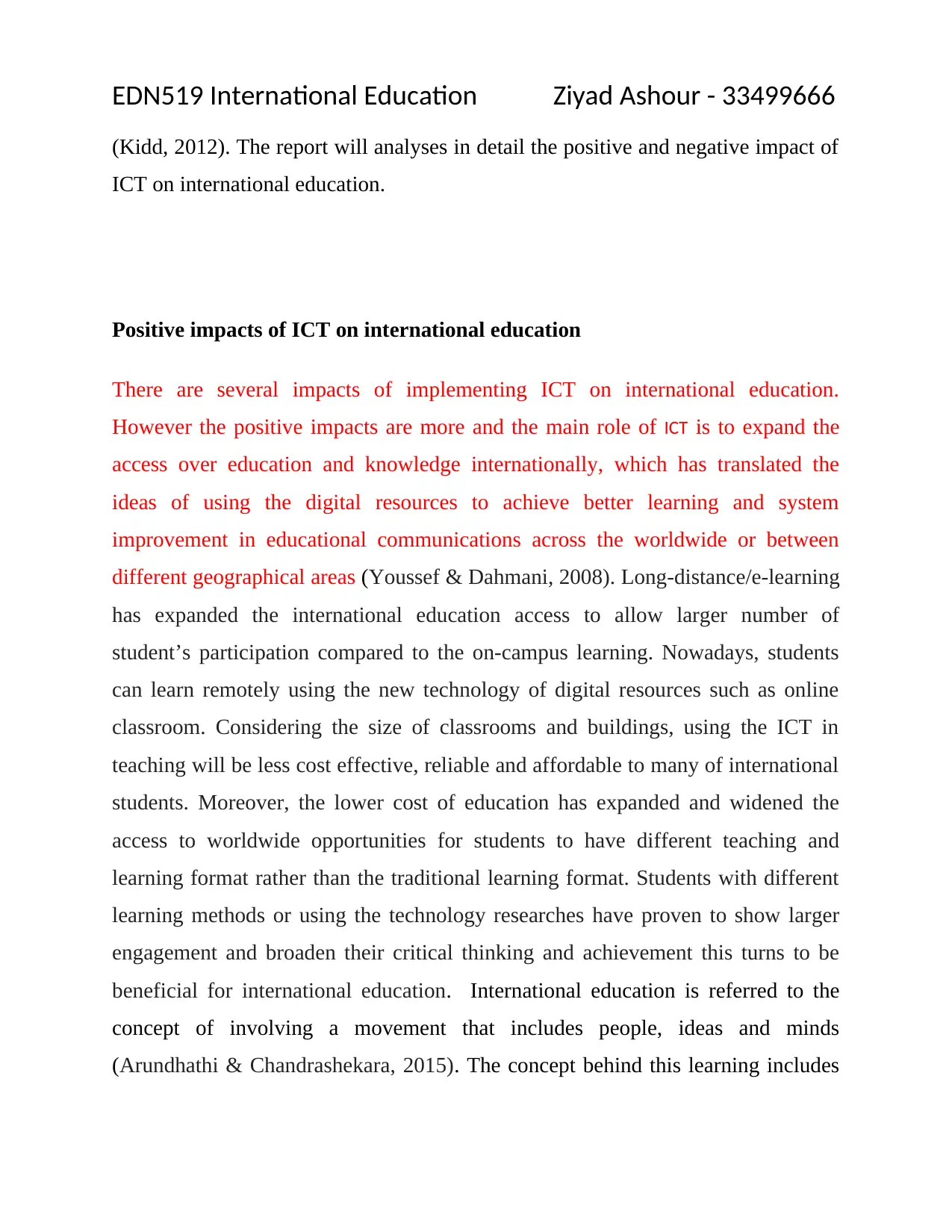
EDN519 International Education Ziyad Ashour - 33499666
(Kidd, 2012). The report will analyses in detail the positive and negative impact of
ICT on international education.
Positive impacts of ICT on international education
There are several impacts of implementing ICT on international education.
However the positive impacts are more and the main role of ICT is to expand the
access over education and knowledge internationally, which has translated the
ideas of using the digital resources to achieve better learning and system
improvement in educational communications across the worldwide or between
different geographical areas (Youssef & Dahmani, 2008). Long-distance/e-learning
has expanded the international education access to allow larger number of
student’s participation compared to the on-campus learning. Nowadays, students
can learn remotely using the new technology of digital resources such as online
classroom. Considering the size of classrooms and buildings, using the ICT in
teaching will be less cost effective, reliable and affordable to many of international
students. Moreover, the lower cost of education has expanded and widened the
access to worldwide opportunities for students to have different teaching and
learning format rather than the traditional learning format. Students with different
learning methods or using the technology researches have proven to show larger
engagement and broaden their critical thinking and achievement this turns to be
beneficial for international education. International education is referred to the
concept of involving a movement that includes people, ideas and minds
(Arundhathi & Chandrashekara, 2015). The concept behind this learning includes
(Kidd, 2012). The report will analyses in detail the positive and negative impact of
ICT on international education.
Positive impacts of ICT on international education
There are several impacts of implementing ICT on international education.
However the positive impacts are more and the main role of ICT is to expand the
access over education and knowledge internationally, which has translated the
ideas of using the digital resources to achieve better learning and system
improvement in educational communications across the worldwide or between
different geographical areas (Youssef & Dahmani, 2008). Long-distance/e-learning
has expanded the international education access to allow larger number of
student’s participation compared to the on-campus learning. Nowadays, students
can learn remotely using the new technology of digital resources such as online
classroom. Considering the size of classrooms and buildings, using the ICT in
teaching will be less cost effective, reliable and affordable to many of international
students. Moreover, the lower cost of education has expanded and widened the
access to worldwide opportunities for students to have different teaching and
learning format rather than the traditional learning format. Students with different
learning methods or using the technology researches have proven to show larger
engagement and broaden their critical thinking and achievement this turns to be
beneficial for international education. International education is referred to the
concept of involving a movement that includes people, ideas and minds
(Arundhathi & Chandrashekara, 2015). The concept behind this learning includes
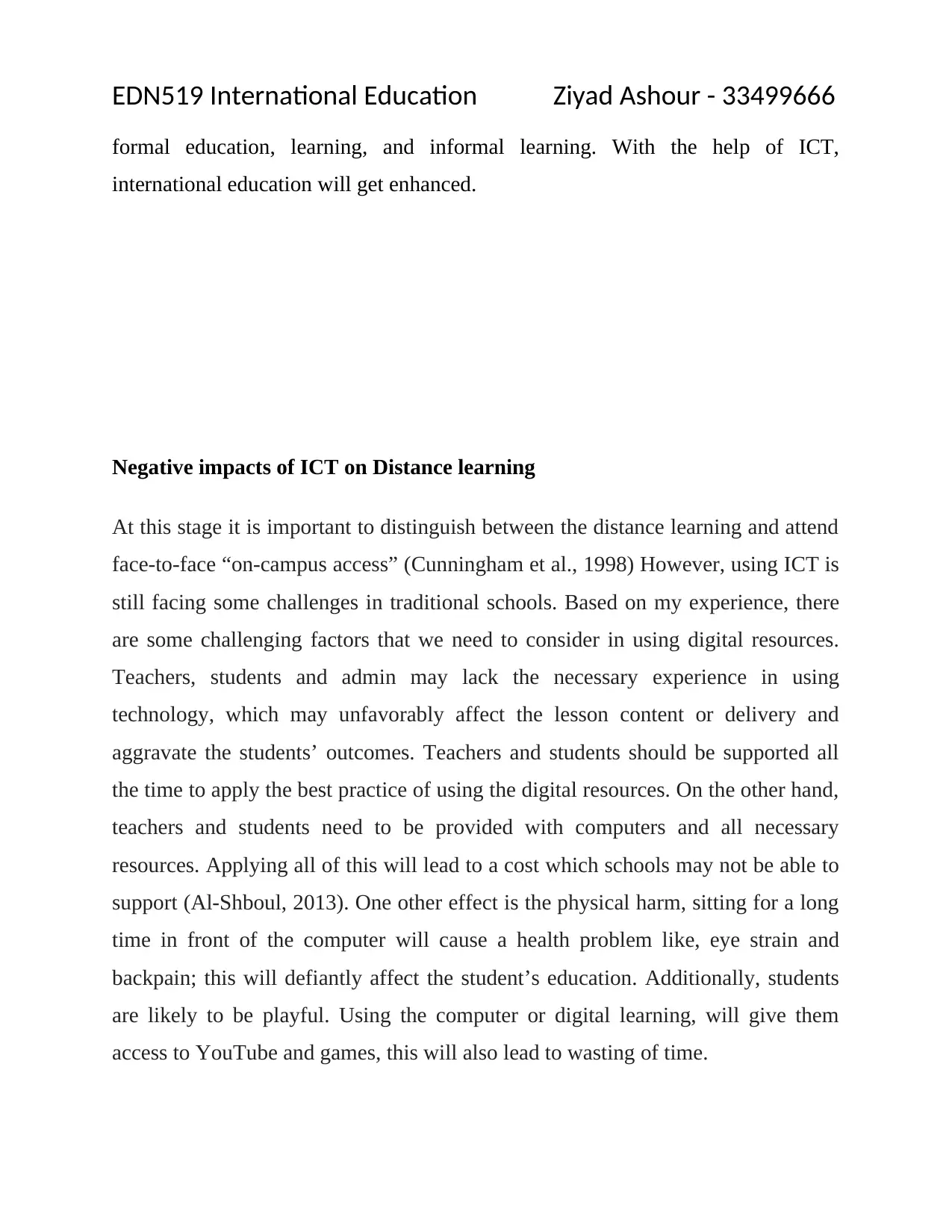
EDN519 International Education Ziyad Ashour - 33499666
formal education, learning, and informal learning. With the help of ICT,
international education will get enhanced.
Negative impacts of ICT on Distance learning
At this stage it is important to distinguish between the distance learning and attend
face-to-face “on-campus access” (Cunningham et al., 1998) However, using ICT is
still facing some challenges in traditional schools. Based on my experience, there
are some challenging factors that we need to consider in using digital resources.
Teachers, students and admin may lack the necessary experience in using
technology, which may unfavorably affect the lesson content or delivery and
aggravate the students’ outcomes. Teachers and students should be supported all
the time to apply the best practice of using the digital resources. On the other hand,
teachers and students need to be provided with computers and all necessary
resources. Applying all of this will lead to a cost which schools may not be able to
support (Al-Shboul, 2013). One other effect is the physical harm, sitting for a long
time in front of the computer will cause a health problem like, eye strain and
backpain; this will defiantly affect the student’s education. Additionally, students
are likely to be playful. Using the computer or digital learning, will give them
access to YouTube and games, this will also lead to wasting of time.
formal education, learning, and informal learning. With the help of ICT,
international education will get enhanced.
Negative impacts of ICT on Distance learning
At this stage it is important to distinguish between the distance learning and attend
face-to-face “on-campus access” (Cunningham et al., 1998) However, using ICT is
still facing some challenges in traditional schools. Based on my experience, there
are some challenging factors that we need to consider in using digital resources.
Teachers, students and admin may lack the necessary experience in using
technology, which may unfavorably affect the lesson content or delivery and
aggravate the students’ outcomes. Teachers and students should be supported all
the time to apply the best practice of using the digital resources. On the other hand,
teachers and students need to be provided with computers and all necessary
resources. Applying all of this will lead to a cost which schools may not be able to
support (Al-Shboul, 2013). One other effect is the physical harm, sitting for a long
time in front of the computer will cause a health problem like, eye strain and
backpain; this will defiantly affect the student’s education. Additionally, students
are likely to be playful. Using the computer or digital learning, will give them
access to YouTube and games, this will also lead to wasting of time.
⊘ This is a preview!⊘
Do you want full access?
Subscribe today to unlock all pages.

Trusted by 1+ million students worldwide
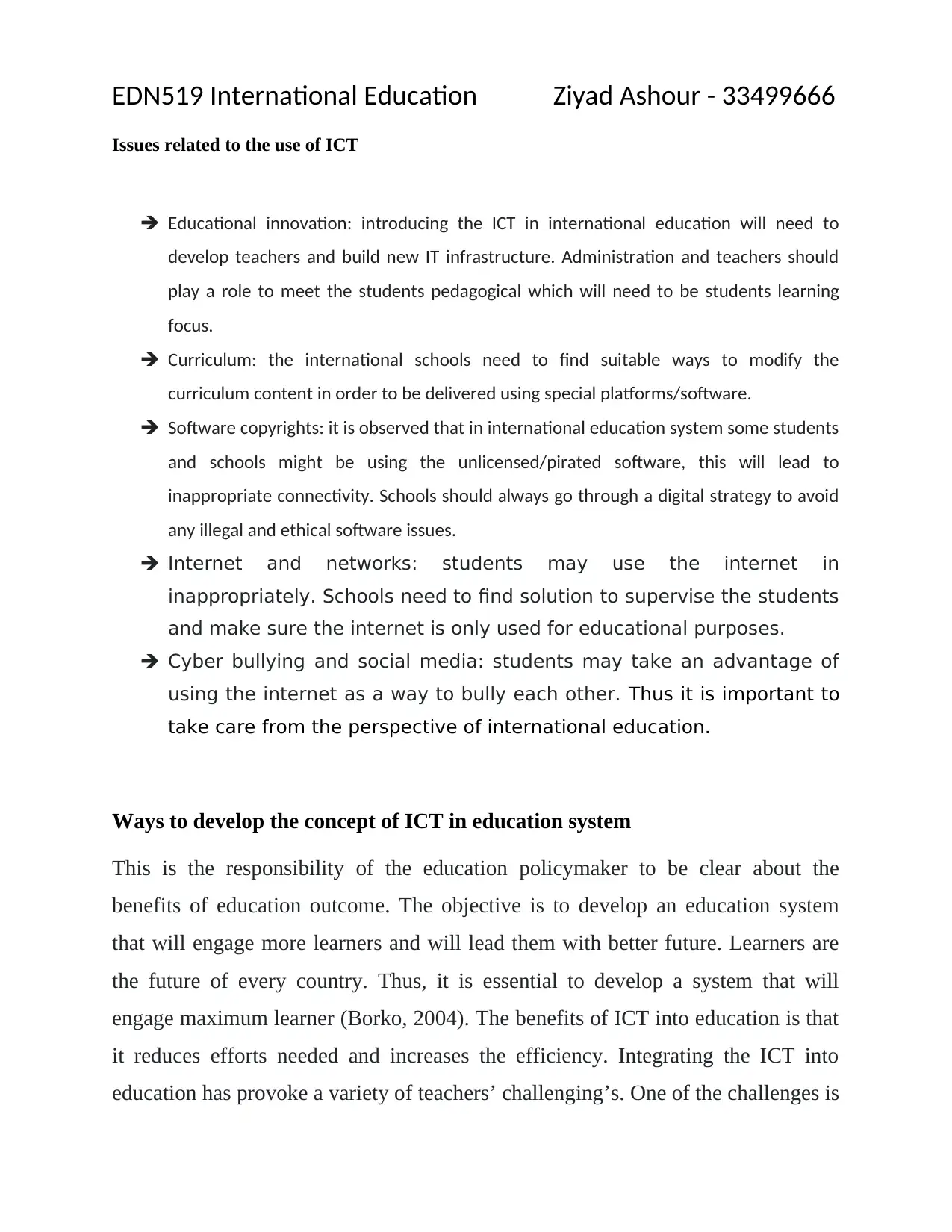
EDN519 International Education Ziyad Ashour - 33499666
Issues related to the use of ICT
Educational innovation: introducing the ICT in international education will need to
develop teachers and build new IT infrastructure. Administration and teachers should
play a role to meet the students pedagogical which will need to be students learning
focus.
Curriculum: the international schools need to find suitable ways to modify the
curriculum content in order to be delivered using special platforms/software.
Software copyrights: it is observed that in international education system some students
and schools might be using the unlicensed/pirated software, this will lead to
inappropriate connectivity. Schools should always go through a digital strategy to avoid
any illegal and ethical software issues.
Internet and networks: students may use the internet in
inappropriately. Schools need to find solution to supervise the students
and make sure the internet is only used for educational purposes.
Cyber bullying and social media: students may take an advantage of
using the internet as a way to bully each other. Thus it is important to
take care from the perspective of international education.
Ways to develop the concept of ICT in education system
This is the responsibility of the education policymaker to be clear about the
benefits of education outcome. The objective is to develop an education system
that will engage more learners and will lead them with better future. Learners are
the future of every country. Thus, it is essential to develop a system that will
engage maximum learner (Borko, 2004). The benefits of ICT into education is that
it reduces efforts needed and increases the efficiency. Integrating the ICT into
education has provoke a variety of teachers’ challenging’s. One of the challenges is
Issues related to the use of ICT
Educational innovation: introducing the ICT in international education will need to
develop teachers and build new IT infrastructure. Administration and teachers should
play a role to meet the students pedagogical which will need to be students learning
focus.
Curriculum: the international schools need to find suitable ways to modify the
curriculum content in order to be delivered using special platforms/software.
Software copyrights: it is observed that in international education system some students
and schools might be using the unlicensed/pirated software, this will lead to
inappropriate connectivity. Schools should always go through a digital strategy to avoid
any illegal and ethical software issues.
Internet and networks: students may use the internet in
inappropriately. Schools need to find solution to supervise the students
and make sure the internet is only used for educational purposes.
Cyber bullying and social media: students may take an advantage of
using the internet as a way to bully each other. Thus it is important to
take care from the perspective of international education.
Ways to develop the concept of ICT in education system
This is the responsibility of the education policymaker to be clear about the
benefits of education outcome. The objective is to develop an education system
that will engage more learners and will lead them with better future. Learners are
the future of every country. Thus, it is essential to develop a system that will
engage maximum learner (Borko, 2004). The benefits of ICT into education is that
it reduces efforts needed and increases the efficiency. Integrating the ICT into
education has provoke a variety of teachers’ challenging’s. One of the challenges is
Paraphrase This Document
Need a fresh take? Get an instant paraphrase of this document with our AI Paraphraser
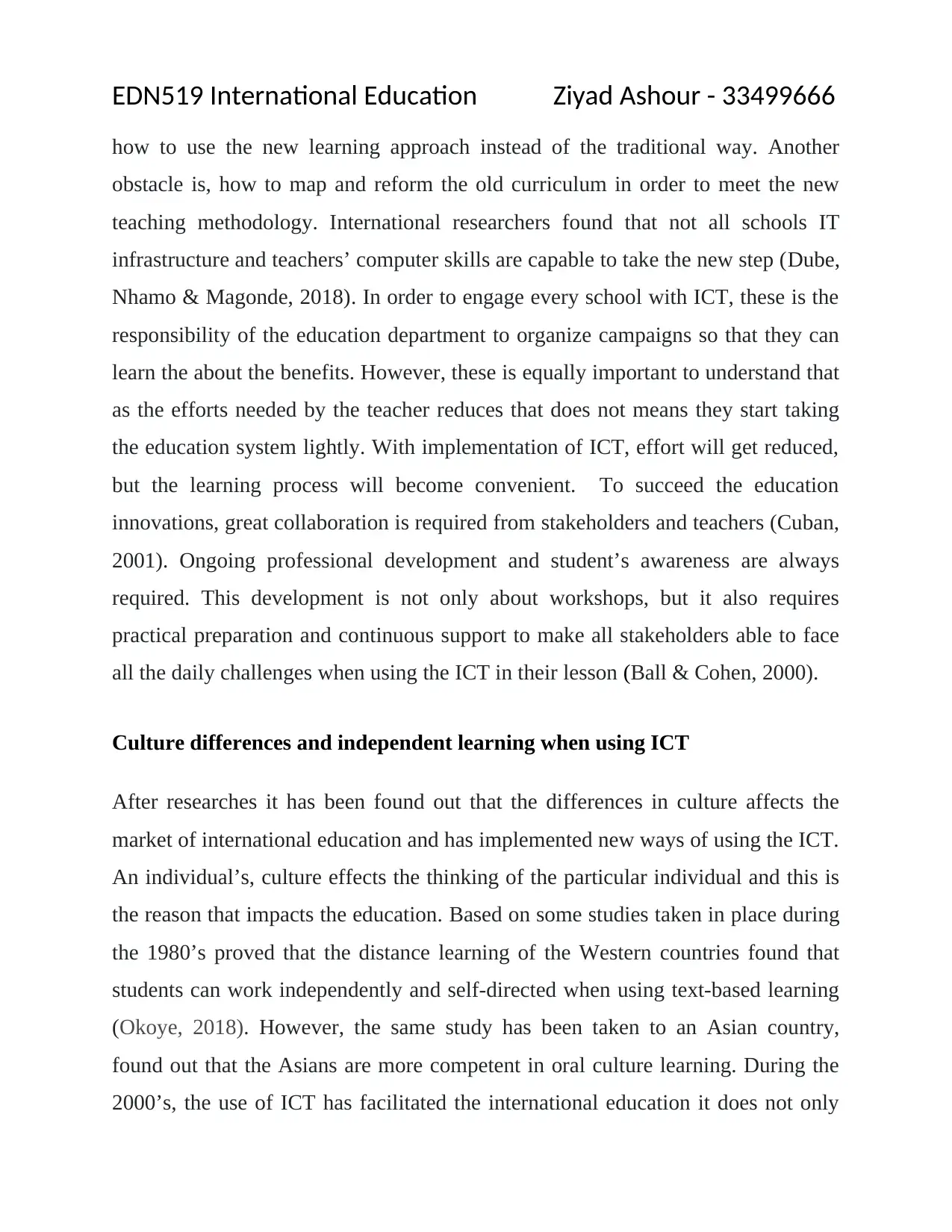
EDN519 International Education Ziyad Ashour - 33499666
how to use the new learning approach instead of the traditional way. Another
obstacle is, how to map and reform the old curriculum in order to meet the new
teaching methodology. International researchers found that not all schools IT
infrastructure and teachers’ computer skills are capable to take the new step (Dube,
Nhamo & Magonde, 2018). In order to engage every school with ICT, these is the
responsibility of the education department to organize campaigns so that they can
learn the about the benefits. However, these is equally important to understand that
as the efforts needed by the teacher reduces that does not means they start taking
the education system lightly. With implementation of ICT, effort will get reduced,
but the learning process will become convenient. To succeed the education
innovations, great collaboration is required from stakeholders and teachers (Cuban,
2001). Ongoing professional development and student’s awareness are always
required. This development is not only about workshops, but it also requires
practical preparation and continuous support to make all stakeholders able to face
all the daily challenges when using the ICT in their lesson (Ball & Cohen, 2000).
Culture differences and independent learning when using ICT
After researches it has been found out that the differences in culture affects the
market of international education and has implemented new ways of using the ICT.
An individual’s, culture effects the thinking of the particular individual and this is
the reason that impacts the education. Based on some studies taken in place during
the 1980’s proved that the distance learning of the Western countries found that
students can work independently and self-directed when using text-based learning
(Okoye, 2018). However, the same study has been taken to an Asian country,
found out that the Asians are more competent in oral culture learning. During the
2000’s, the use of ICT has facilitated the international education it does not only
how to use the new learning approach instead of the traditional way. Another
obstacle is, how to map and reform the old curriculum in order to meet the new
teaching methodology. International researchers found that not all schools IT
infrastructure and teachers’ computer skills are capable to take the new step (Dube,
Nhamo & Magonde, 2018). In order to engage every school with ICT, these is the
responsibility of the education department to organize campaigns so that they can
learn the about the benefits. However, these is equally important to understand that
as the efforts needed by the teacher reduces that does not means they start taking
the education system lightly. With implementation of ICT, effort will get reduced,
but the learning process will become convenient. To succeed the education
innovations, great collaboration is required from stakeholders and teachers (Cuban,
2001). Ongoing professional development and student’s awareness are always
required. This development is not only about workshops, but it also requires
practical preparation and continuous support to make all stakeholders able to face
all the daily challenges when using the ICT in their lesson (Ball & Cohen, 2000).
Culture differences and independent learning when using ICT
After researches it has been found out that the differences in culture affects the
market of international education and has implemented new ways of using the ICT.
An individual’s, culture effects the thinking of the particular individual and this is
the reason that impacts the education. Based on some studies taken in place during
the 1980’s proved that the distance learning of the Western countries found that
students can work independently and self-directed when using text-based learning
(Okoye, 2018). However, the same study has been taken to an Asian country,
found out that the Asians are more competent in oral culture learning. During the
2000’s, the use of ICT has facilitated the international education it does not only
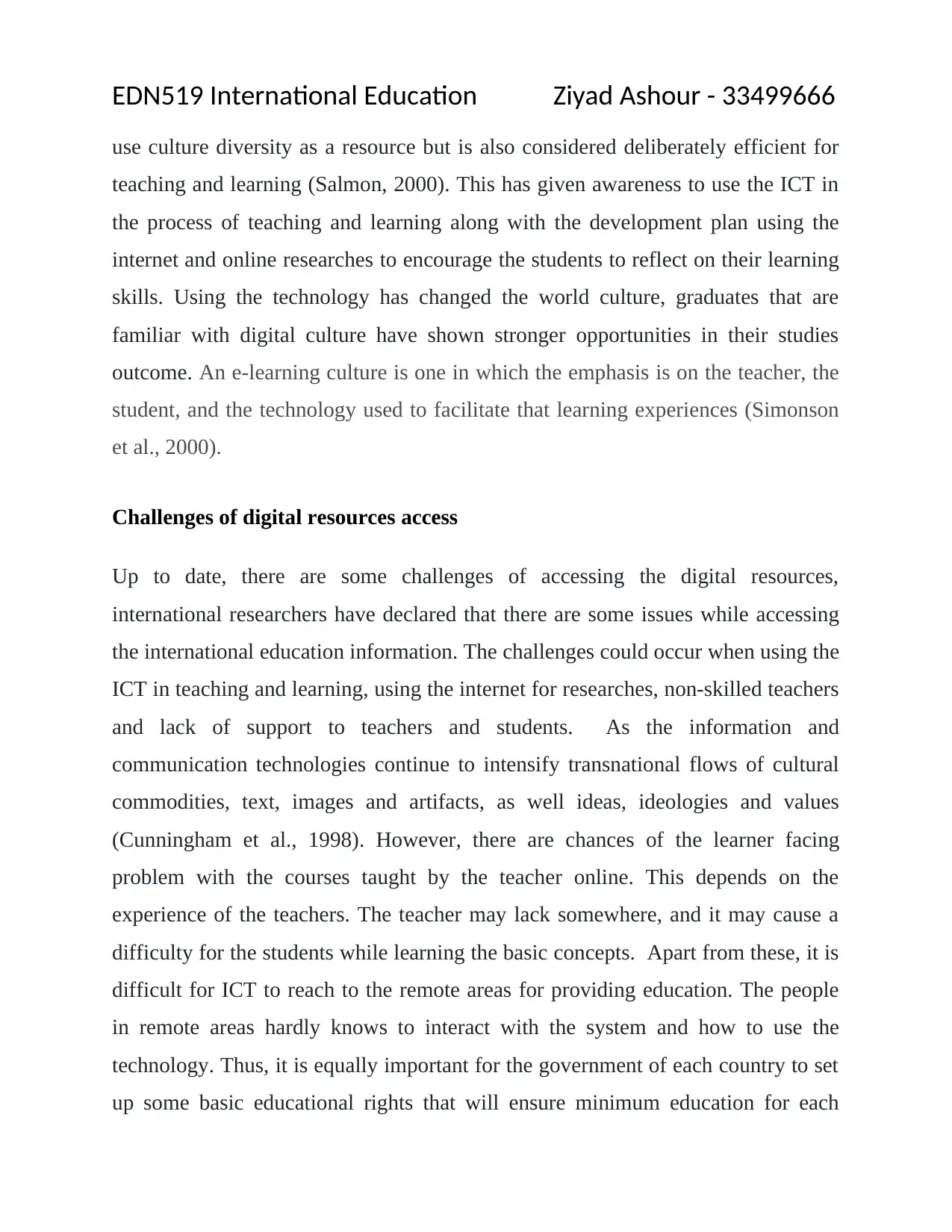
EDN519 International Education Ziyad Ashour - 33499666
use culture diversity as a resource but is also considered deliberately efficient for
teaching and learning (Salmon, 2000). This has given awareness to use the ICT in
the process of teaching and learning along with the development plan using the
internet and online researches to encourage the students to reflect on their learning
skills. Using the technology has changed the world culture, graduates that are
familiar with digital culture have shown stronger opportunities in their studies
outcome. An e-learning culture is one in which the emphasis is on the teacher, the
student, and the technology used to facilitate that learning experiences (Simonson
et al., 2000).
Challenges of digital resources access
Up to date, there are some challenges of accessing the digital resources,
international researchers have declared that there are some issues while accessing
the international education information. The challenges could occur when using the
ICT in teaching and learning, using the internet for researches, non-skilled teachers
and lack of support to teachers and students. As the information and
communication technologies continue to intensify transnational flows of cultural
commodities, text, images and artifacts, as well ideas, ideologies and values
(Cunningham et al., 1998). However, there are chances of the learner facing
problem with the courses taught by the teacher online. This depends on the
experience of the teachers. The teacher may lack somewhere, and it may cause a
difficulty for the students while learning the basic concepts. Apart from these, it is
difficult for ICT to reach to the remote areas for providing education. The people
in remote areas hardly knows to interact with the system and how to use the
technology. Thus, it is equally important for the government of each country to set
up some basic educational rights that will ensure minimum education for each
use culture diversity as a resource but is also considered deliberately efficient for
teaching and learning (Salmon, 2000). This has given awareness to use the ICT in
the process of teaching and learning along with the development plan using the
internet and online researches to encourage the students to reflect on their learning
skills. Using the technology has changed the world culture, graduates that are
familiar with digital culture have shown stronger opportunities in their studies
outcome. An e-learning culture is one in which the emphasis is on the teacher, the
student, and the technology used to facilitate that learning experiences (Simonson
et al., 2000).
Challenges of digital resources access
Up to date, there are some challenges of accessing the digital resources,
international researchers have declared that there are some issues while accessing
the international education information. The challenges could occur when using the
ICT in teaching and learning, using the internet for researches, non-skilled teachers
and lack of support to teachers and students. As the information and
communication technologies continue to intensify transnational flows of cultural
commodities, text, images and artifacts, as well ideas, ideologies and values
(Cunningham et al., 1998). However, there are chances of the learner facing
problem with the courses taught by the teacher online. This depends on the
experience of the teachers. The teacher may lack somewhere, and it may cause a
difficulty for the students while learning the basic concepts. Apart from these, it is
difficult for ICT to reach to the remote areas for providing education. The people
in remote areas hardly knows to interact with the system and how to use the
technology. Thus, it is equally important for the government of each country to set
up some basic educational rights that will ensure minimum education for each
⊘ This is a preview!⊘
Do you want full access?
Subscribe today to unlock all pages.

Trusted by 1+ million students worldwide
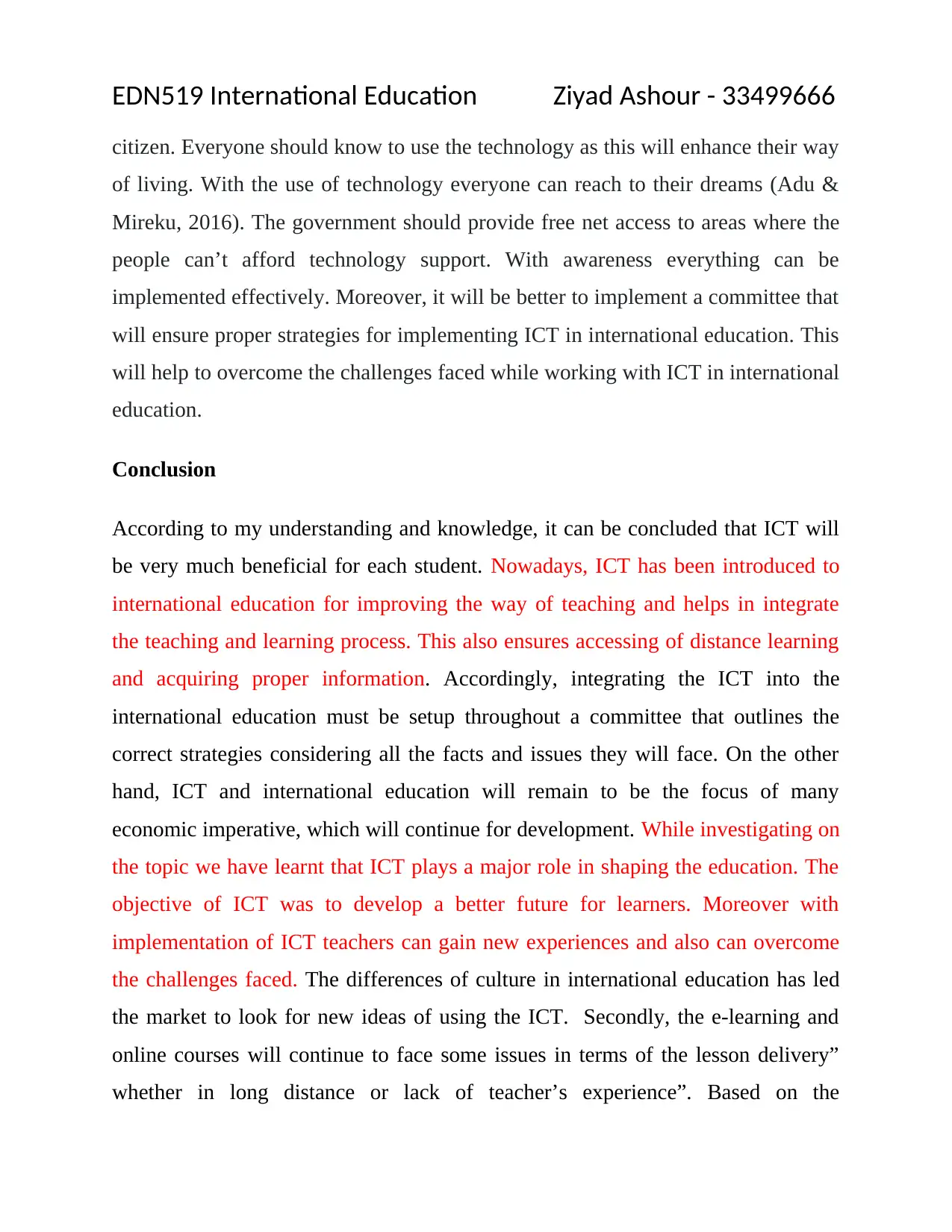
EDN519 International Education Ziyad Ashour - 33499666
citizen. Everyone should know to use the technology as this will enhance their way
of living. With the use of technology everyone can reach to their dreams (Adu &
Mireku, 2016). The government should provide free net access to areas where the
people can’t afford technology support. With awareness everything can be
implemented effectively. Moreover, it will be better to implement a committee that
will ensure proper strategies for implementing ICT in international education. This
will help to overcome the challenges faced while working with ICT in international
education.
Conclusion
According to my understanding and knowledge, it can be concluded that ICT will
be very much beneficial for each student. Nowadays, ICT has been introduced to
international education for improving the way of teaching and helps in integrate
the teaching and learning process. This also ensures accessing of distance learning
and acquiring proper information. Accordingly, integrating the ICT into the
international education must be setup throughout a committee that outlines the
correct strategies considering all the facts and issues they will face. On the other
hand, ICT and international education will remain to be the focus of many
economic imperative, which will continue for development. While investigating on
the topic we have learnt that ICT plays a major role in shaping the education. The
objective of ICT was to develop a better future for learners. Moreover with
implementation of ICT teachers can gain new experiences and also can overcome
the challenges faced. The differences of culture in international education has led
the market to look for new ideas of using the ICT. Secondly, the e-learning and
online courses will continue to face some issues in terms of the lesson delivery”
whether in long distance or lack of teacher’s experience”. Based on the
citizen. Everyone should know to use the technology as this will enhance their way
of living. With the use of technology everyone can reach to their dreams (Adu &
Mireku, 2016). The government should provide free net access to areas where the
people can’t afford technology support. With awareness everything can be
implemented effectively. Moreover, it will be better to implement a committee that
will ensure proper strategies for implementing ICT in international education. This
will help to overcome the challenges faced while working with ICT in international
education.
Conclusion
According to my understanding and knowledge, it can be concluded that ICT will
be very much beneficial for each student. Nowadays, ICT has been introduced to
international education for improving the way of teaching and helps in integrate
the teaching and learning process. This also ensures accessing of distance learning
and acquiring proper information. Accordingly, integrating the ICT into the
international education must be setup throughout a committee that outlines the
correct strategies considering all the facts and issues they will face. On the other
hand, ICT and international education will remain to be the focus of many
economic imperative, which will continue for development. While investigating on
the topic we have learnt that ICT plays a major role in shaping the education. The
objective of ICT was to develop a better future for learners. Moreover with
implementation of ICT teachers can gain new experiences and also can overcome
the challenges faced. The differences of culture in international education has led
the market to look for new ideas of using the ICT. Secondly, the e-learning and
online courses will continue to face some issues in terms of the lesson delivery”
whether in long distance or lack of teacher’s experience”. Based on the
Paraphrase This Document
Need a fresh take? Get an instant paraphrase of this document with our AI Paraphraser

EDN519 International Education Ziyad Ashour - 33499666
international education study, the engagement between the staffs and teachers can
be improved. However, in some education system it is observed that the members
of education system are not happy with the transformation.
international education study, the engagement between the staffs and teachers can
be improved. However, in some education system it is observed that the members
of education system are not happy with the transformation.
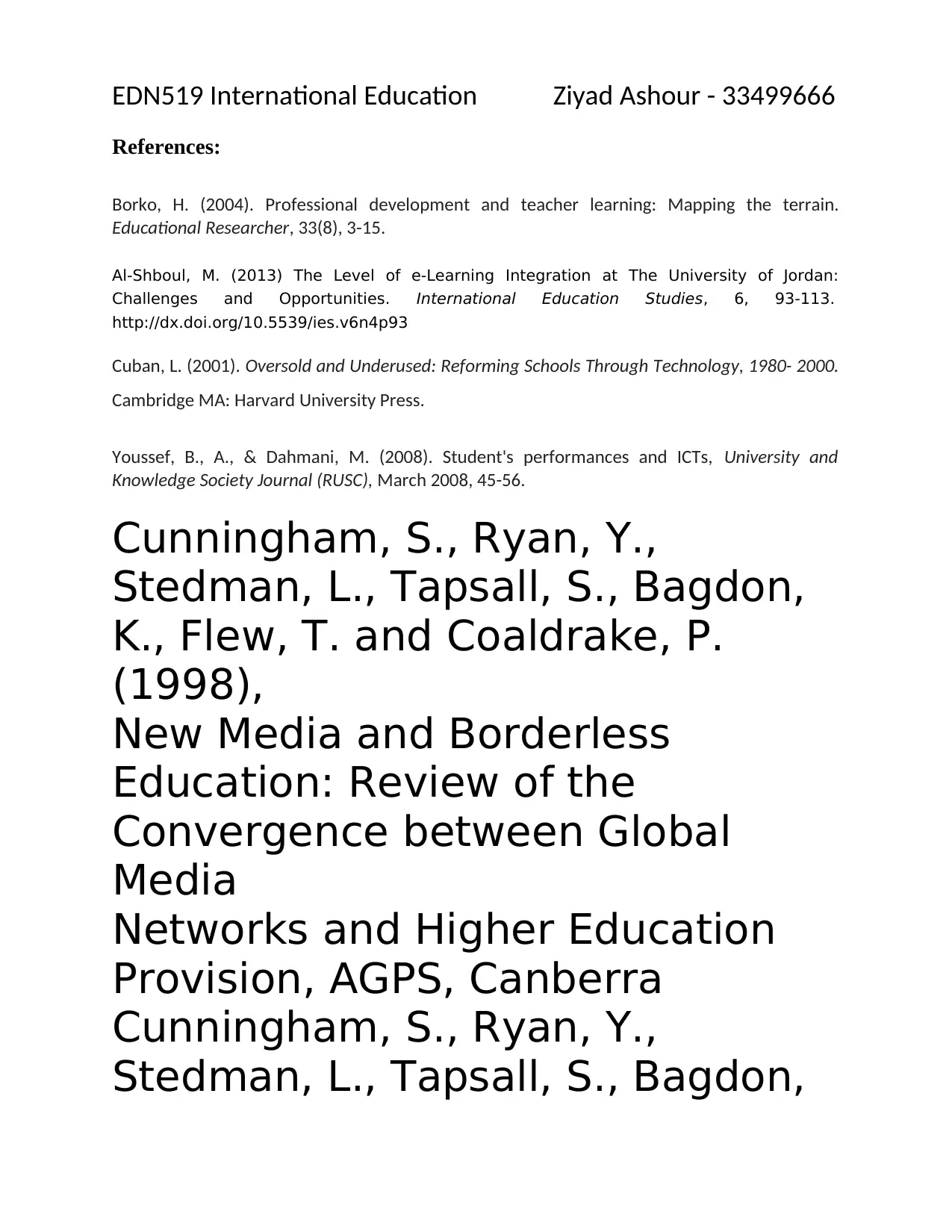
EDN519 International Education Ziyad Ashour - 33499666
References:
Borko, H. (2004). Professional development and teacher learning: Mapping the terrain.
Educational Researcher, 33(8), 3-15.
Al-Shboul, M. (2013) The Level of e-Learning Integration at The University of Jordan:
Challenges and Opportunities. International Education Studies, 6, 93-113.
http://dx.doi.org/10.5539/ies.v6n4p93
Cuban, L. (2001). Oversold and Underused: Reforming Schools Through Technology, 1980- 2000.
Cambridge MA: Harvard University Press.
Youssef, B., A., & Dahmani, M. (2008). Student's performances and ICTs, University and
Knowledge Society Journal (RUSC), March 2008, 45-56.
Cunningham, S., Ryan, Y.,
Stedman, L., Tapsall, S., Bagdon,
K., Flew, T. and Coaldrake, P.
(1998),
New Media and Borderless
Education: Review of the
Convergence between Global
Media
Networks and Higher Education
Provision, AGPS, Canberra
Cunningham, S., Ryan, Y.,
Stedman, L., Tapsall, S., Bagdon,
References:
Borko, H. (2004). Professional development and teacher learning: Mapping the terrain.
Educational Researcher, 33(8), 3-15.
Al-Shboul, M. (2013) The Level of e-Learning Integration at The University of Jordan:
Challenges and Opportunities. International Education Studies, 6, 93-113.
http://dx.doi.org/10.5539/ies.v6n4p93
Cuban, L. (2001). Oversold and Underused: Reforming Schools Through Technology, 1980- 2000.
Cambridge MA: Harvard University Press.
Youssef, B., A., & Dahmani, M. (2008). Student's performances and ICTs, University and
Knowledge Society Journal (RUSC), March 2008, 45-56.
Cunningham, S., Ryan, Y.,
Stedman, L., Tapsall, S., Bagdon,
K., Flew, T. and Coaldrake, P.
(1998),
New Media and Borderless
Education: Review of the
Convergence between Global
Media
Networks and Higher Education
Provision, AGPS, Canberra
Cunningham, S., Ryan, Y.,
Stedman, L., Tapsall, S., Bagdon,
⊘ This is a preview!⊘
Do you want full access?
Subscribe today to unlock all pages.

Trusted by 1+ million students worldwide
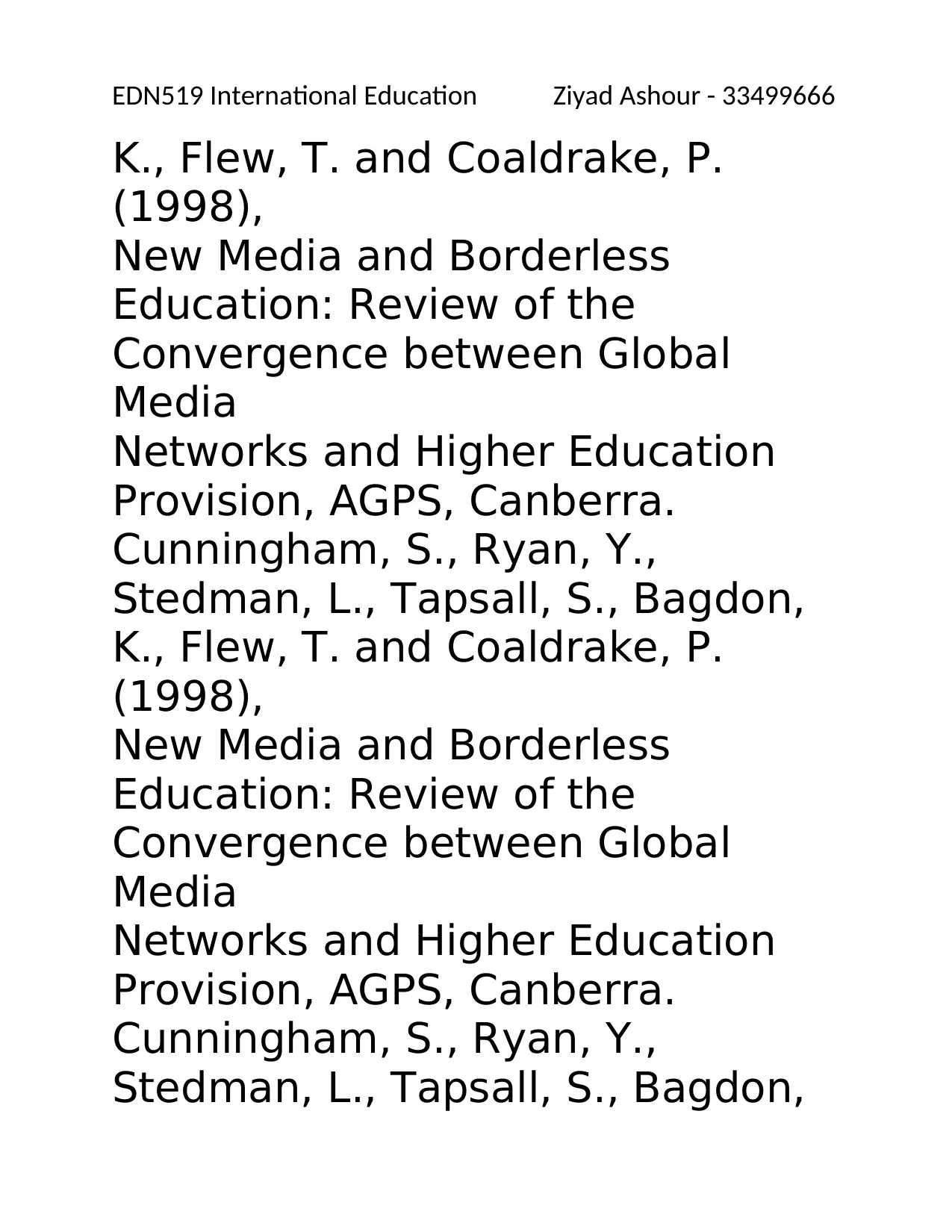
EDN519 International Education Ziyad Ashour - 33499666
K., Flew, T. and Coaldrake, P.
(1998),
New Media and Borderless
Education: Review of the
Convergence between Global
Media
Networks and Higher Education
Provision, AGPS, Canberra.
Cunningham, S., Ryan, Y.,
Stedman, L., Tapsall, S., Bagdon,
K., Flew, T. and Coaldrake, P.
(1998),
New Media and Borderless
Education: Review of the
Convergence between Global
Media
Networks and Higher Education
Provision, AGPS, Canberra.
Cunningham, S., Ryan, Y.,
Stedman, L., Tapsall, S., Bagdon,
K., Flew, T. and Coaldrake, P.
(1998),
New Media and Borderless
Education: Review of the
Convergence between Global
Media
Networks and Higher Education
Provision, AGPS, Canberra.
Cunningham, S., Ryan, Y.,
Stedman, L., Tapsall, S., Bagdon,
K., Flew, T. and Coaldrake, P.
(1998),
New Media and Borderless
Education: Review of the
Convergence between Global
Media
Networks and Higher Education
Provision, AGPS, Canberra.
Cunningham, S., Ryan, Y.,
Stedman, L., Tapsall, S., Bagdon,
Paraphrase This Document
Need a fresh take? Get an instant paraphrase of this document with our AI Paraphraser
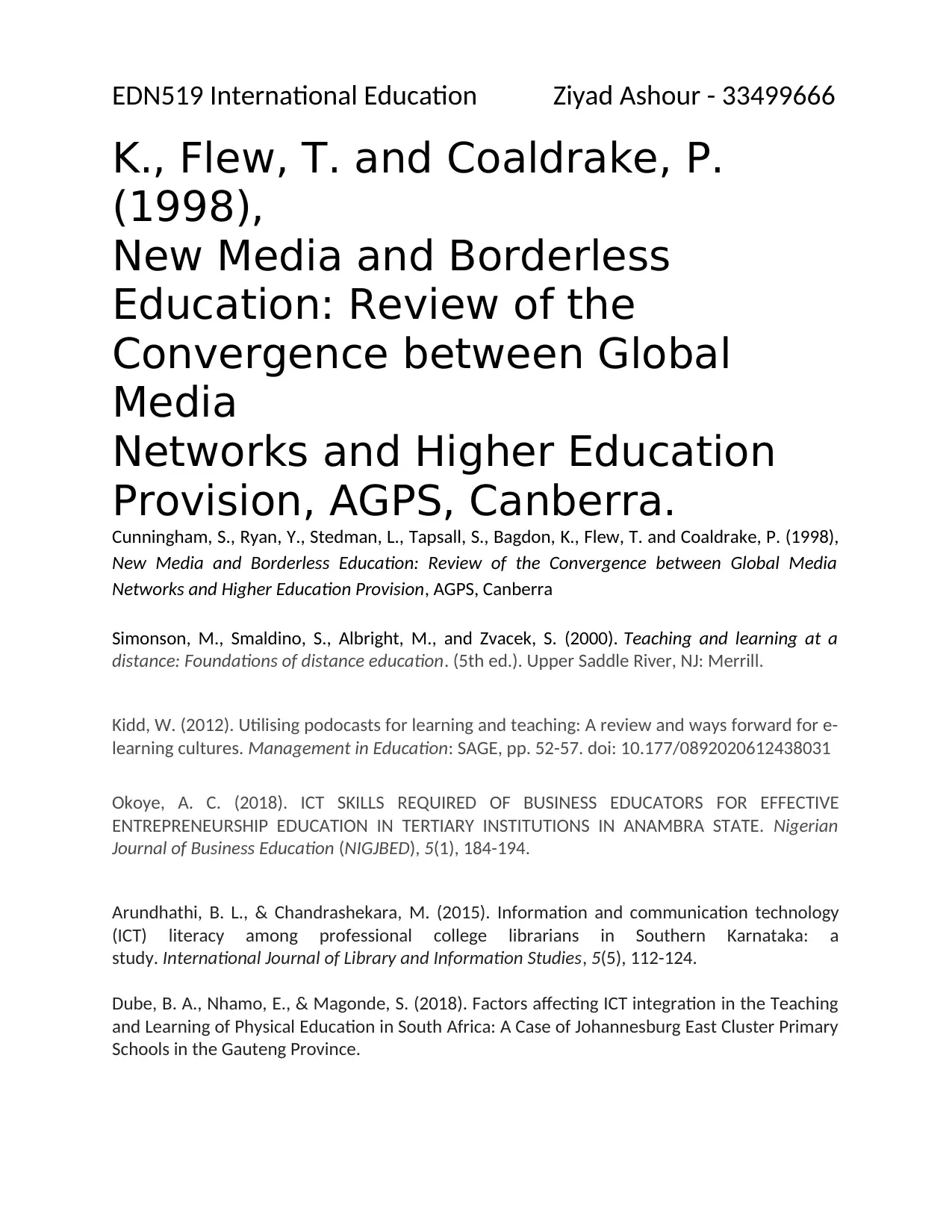
EDN519 International Education Ziyad Ashour - 33499666
K., Flew, T. and Coaldrake, P.
(1998),
New Media and Borderless
Education: Review of the
Convergence between Global
Media
Networks and Higher Education
Provision, AGPS, Canberra.
Cunningham, S., Ryan, Y., Stedman, L., Tapsall, S., Bagdon, K., Flew, T. and Coaldrake, P. (1998),
New Media and Borderless Education: Review of the Convergence between Global Media
Networks and Higher Education Provision, AGPS, Canberra
Simonson, M., Smaldino, S., Albright, M., and Zvacek, S. (2000). Teaching and learning at a
distance: Foundations of distance education. (5th ed.). Upper Saddle River, NJ: Merrill.
Kidd, W. (2012). Utilising podocasts for learning and teaching: A review and ways forward for e-
learning cultures. Management in Education: SAGE, pp. 52-57. doi: 10.177/0892020612438031
Okoye, A. C. (2018). ICT SKILLS REQUIRED OF BUSINESS EDUCATORS FOR EFFECTIVE
ENTREPRENEURSHIP EDUCATION IN TERTIARY INSTITUTIONS IN ANAMBRA STATE. Nigerian
Journal of Business Education (NIGJBED), 5(1), 184-194.
Arundhathi, B. L., & Chandrashekara, M. (2015). Information and communication technology
(ICT) literacy among professional college librarians in Southern Karnataka: a
study. International Journal of Library and Information Studies, 5(5), 112-124.
Dube, B. A., Nhamo, E., & Magonde, S. (2018). Factors affecting ICT integration in the Teaching
and Learning of Physical Education in South Africa: A Case of Johannesburg East Cluster Primary
Schools in the Gauteng Province.
K., Flew, T. and Coaldrake, P.
(1998),
New Media and Borderless
Education: Review of the
Convergence between Global
Media
Networks and Higher Education
Provision, AGPS, Canberra.
Cunningham, S., Ryan, Y., Stedman, L., Tapsall, S., Bagdon, K., Flew, T. and Coaldrake, P. (1998),
New Media and Borderless Education: Review of the Convergence between Global Media
Networks and Higher Education Provision, AGPS, Canberra
Simonson, M., Smaldino, S., Albright, M., and Zvacek, S. (2000). Teaching and learning at a
distance: Foundations of distance education. (5th ed.). Upper Saddle River, NJ: Merrill.
Kidd, W. (2012). Utilising podocasts for learning and teaching: A review and ways forward for e-
learning cultures. Management in Education: SAGE, pp. 52-57. doi: 10.177/0892020612438031
Okoye, A. C. (2018). ICT SKILLS REQUIRED OF BUSINESS EDUCATORS FOR EFFECTIVE
ENTREPRENEURSHIP EDUCATION IN TERTIARY INSTITUTIONS IN ANAMBRA STATE. Nigerian
Journal of Business Education (NIGJBED), 5(1), 184-194.
Arundhathi, B. L., & Chandrashekara, M. (2015). Information and communication technology
(ICT) literacy among professional college librarians in Southern Karnataka: a
study. International Journal of Library and Information Studies, 5(5), 112-124.
Dube, B. A., Nhamo, E., & Magonde, S. (2018). Factors affecting ICT integration in the Teaching
and Learning of Physical Education in South Africa: A Case of Johannesburg East Cluster Primary
Schools in the Gauteng Province.

EDN519 International Education Ziyad Ashour - 33499666
Adu, E. O., & Mireku, A. A. (2016). The Influence of Information and Communication Technology
(ICT) in Improving Teaching of Environmental Education. Journal of Human Ecology, 55(1-2), 1-
8.
Adu, E. O., & Mireku, A. A. (2016). The Influence of Information and Communication Technology
(ICT) in Improving Teaching of Environmental Education. Journal of Human Ecology, 55(1-2), 1-
8.
⊘ This is a preview!⊘
Do you want full access?
Subscribe today to unlock all pages.

Trusted by 1+ million students worldwide
1 out of 12
Related Documents
Your All-in-One AI-Powered Toolkit for Academic Success.
+13062052269
info@desklib.com
Available 24*7 on WhatsApp / Email
![[object Object]](/_next/static/media/star-bottom.7253800d.svg)
Unlock your academic potential
Copyright © 2020–2026 A2Z Services. All Rights Reserved. Developed and managed by ZUCOL.





